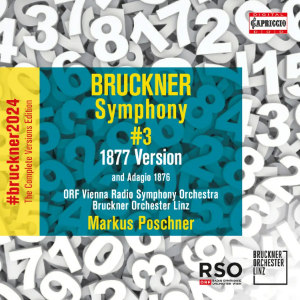
Anton Bruckner (1824-1896)
Symphony No. 3 in D minor (1877 version, ed. Nowak)
Adagio 1876*
ORF Vienna Radio Symphony Orchestra, Bruckner Orchestra Linz*/Markus Poschner
rec. 22 November 2023, Radio Kulturhaus & 24 November 2023, Musikverein, Vienna (symphony); 22 February 2023, Rehearsal Hall, Musiktheater, Linz (Adagio)
Capriccio C8095 [66]
Markus Poschner’s “Complete Versions Edition” for Bruckner’s bicentenary anniversary this year is nearing completion; this is the third version of the Third Symphony to be issued and as a bonus we hear the second of the four extant versions of the second movement: the Adagio, dated October 1876, which Bruckner discarded before the first performance and was discovered by Leopold Nowak; obviously the third version is the one included in the complete symphony recorded here.
I was hoping for a better experience than that provided by Poschner’s recordings of the previous two versions, about which I have been less than complimentary (review 1873; review 1889), on account of his predilection for rushing every movement of this symphony.
My initial crude comparison of timings with other recordings of the 1877 version (featuring the Scherzo with coda, as per here) was not encouraging: true to form, Poschner adheres to his conviction that this symphony must be played fast and furious throughout. Thus it is nearly ten minutes faster than a favourite version by the CSO and Solti – of all people; an unlikely choice, I know, and not a conductor exactly known for hanging about or indeed for his Bruckner. Johannes Wildner on Naxos – which I quite favourably reviewed in 2018 – also takes an hour over the symphony, whereas Poschner is done and dusted in fifty minutes. Having noted this, I embarked upon my listening to this new recording with a heavy heart.
Straight away, we hear the same absurd speed which blights the recordings of the original and 1889 versions. It renders the music devoid of majesty and mystery and sounds frenetic; slowing down so markedly to introduce the second theme, then speeding up again so much for the restatement of the main theme over the string ostinato just sounds wilfully self-conscious; I fail to understand why and how Poschner has applied this idée fixe of extreme speed to all three recordings when no other conductor mangles the score thus. After such distortions, it scarcely matter to me what happens in the remaining movements, as I know I don’t want to hear it again. The Andante is predictably pacy – two minutes faster than Solti and a minute faster than Wildner – surely zippier than just “Bewegt” and certainly not “feierlich” or “quasi Adagio”. The orchestra playing per se is beautiful but the direction undermines the flow of the music. Nobody following the score can sabotage a Bruckner Scherzo but Poschner has a shot at it by producing the fastest account ever, despite the inclusion of the coda. It’s stirring, I suppose, and again very well executed but the prevailing mood is relentless, continuing into the opening of the finale. It lends the turbulent central section a cartoonish quality and the dancing second theme echoing the Trio trips the light fantastic but what should be a grand conclusion simply sounds frantic and feverish.
I have the same reaction here as I do to Poschner’s recordings of the other two versions – which is hardly surprising as his approach is entirely consistent in all three.
The Adagio opens with the same lovely melody already heard in the replacement slow movement – but you will not perhaps be astonished to learn that Poschner takes the movement briskly – over two minutes faster than Wildner, which is not to its advantage. I tested my response by immediately playing the Naxos recording and exhaled gratefully on hearing its graceful, gracious, long-breathed phrasing; here is the grandeur and dignity missing in Poschner’s febrile rendering even if neither Wildner’s orchestra nor the recorded sound is as good as his. His accelerated treatment of the passages towards the end of brass chorale over repeated, pounding string ostinato results in their sounding like Rossini in “choo-choo-train” mode, whereas Wildner accords them a massive presence by playing them at a more aptly moderate pace.
If you like your Bruckner Third on amphetamines, any or all of Poschner’s three recordings could be for you, depending on your preferred version. I shall continue to favour Nézet-Séguin with the Staatskapelle Dresden or Inbal for the original 1873 version, Schaller for the 1874 and 1888/90 versions, with Järvi in Frankfurt in reserve, and Solti for this 1877 version under review.
Ralph Moore
If you purchase this recording using a link below, it generates revenue for MWI and helps us maintain free access to the site



Recording details
22 November, Radio Kulturhaus & 24 November 2023, Musikverein, Vienna; 22 February 2022, Rehearsal Hall, Musiktheater, Linz*

















